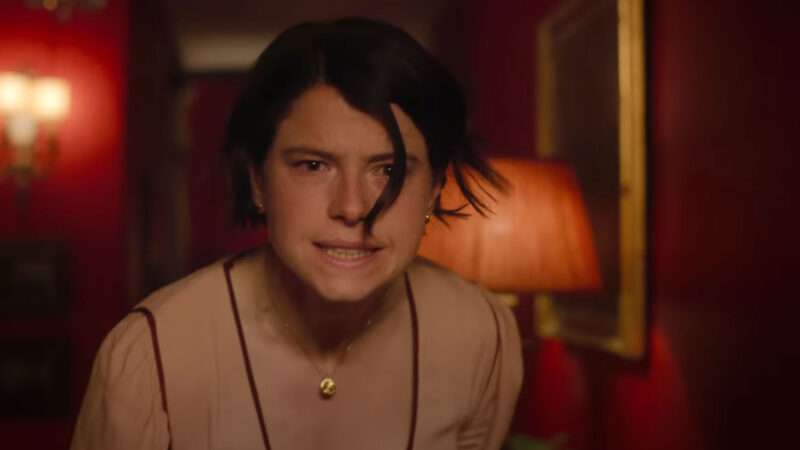
You can't always judge a movie by its title, but Men clearly wants viewers to do just that. On the surface, at least, this surrealist-horror provocation from writer-director Alex Garland is essentially an elaborate, extended, wryly literal riff on the Twitterverse throwaway line about badly behaved dudes: "Ugh. Men. They're all the same."
And yet: This daring, strange, unrepentantly bizarre film, barely resembles anything you've seen before, almost entirely to its credit.
The story follows Harper (Jessie Buckley), a young Londoner still reeling from the death of her husband, who we eventually find out was abusive, as she enters a sprawling hideaway in the English countryside. She's left the city to heal by herself, but from the moment she arrives she encounters a string of, well, men—all of whom act inappropriately, or worse, and all of whom are played by Rory Kinnear.
Kinnear's characters are a catalog of stock terrible dudes: the handsy vicar who blames her for her husband's death, the landlord who can't help but make nosy and awkward remarks, the surly teenager who insults her.
Kinnear's recurrence is part actorly exercise, part metaphorical conceit: These aren't fleshed-out characters so much as illustrative types, as each demonstrates a different way in which men make women uncomfortable or put them in danger. Each encounter restates the titular provocation: Ugh, men, amirite?
And then there are more depraved characters still, including a fully naked man who is scarred and bloody (and also played by Kinnear) who stalks Harper at her retreat and later appears as a sort of pagan forest demon, his skin flecked with thorns and his forehead marked with a green leaf. What in the bloody hell is going on here?
Garland, to his credit, doesn't offer an obvious answer. Instead, the movie moves into ever-more surrealist territory, achieving, in its final moments, a menacing, dreamlike, quasi-trance state.
This sort of gory nightmare-scape will be familiar to viewers who have seen his previous features Ex Machina and Annihilation but may frustrate those looking for clarity and closure.
Clarity and closure, however, aren't the point. Men is a ghoulish tone poem about grief, trauma, and gender-terror, and the icky weirdness of various bodily orifices. It's a breakup movie as filtered through the dream-logic surrealism of David Lynch and the gross-out body horror of David Cronenberg.
In other words, it's an Alex Garland movie through and through. Garland made his name as a novelist and screenwriter, penning the book version of The Beach as well as the screenplays to superior horror films like 28 Days Later and Sunshine before striking out on his own as a director. Behind the camera, Garland's work has focused on female agency and power, natural decay, the frayed bonds of marriage, and the maddening unknowability of a supposedly rule-bound universe that sometimes simply refuses to follow rules, an idea he explored at greater length in 2020's underrated FX miniseries Devs. Over and over again, Garland seems to be trying to decondition viewers from their desire to fully understand the world by battering them with horrific-yet-mesmerizing forms of psychedelia. Oscar Isaac dancing worldlessly with a creepy robot slave isn't a thesis statement; it's just something that washes over you. You either accept its wordless non-logic or you don't.
And so it is with Men, which in the end is far from the simplistic indictment of men you might expect from its gimmicky title. Although it starts with what might seem like a one-note provocation, it slowly twists that provocation into something altogether more opaque, more obscure, and more fascinatingly unique. Men, the gender, may or may not be OK, but Men, the movie, is great.
The post Alex Garland's Provocative <i>Men</i> Asks: Are Men OK? appeared first on Reason.com.







